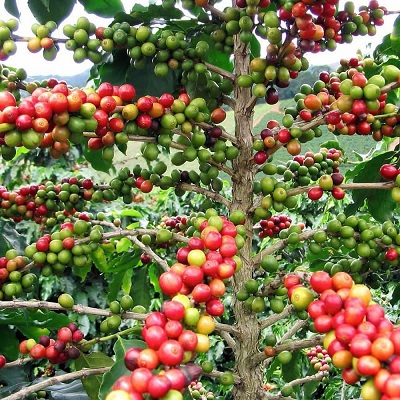
Ethiopia’s coffee production is characterized by its extensive cultivation of Arabica coffee, which is highly regarded for its superior quality and complex flavor profiles. Ethiopian coffee has gained widespread recognition and appreciation on the global stage. It is highly prized by coffee professionals and specialty coffee enthusiasts for its exceptional quality, distinct flavors, and rich cultural heritage. The country’s coffee industry continues to evolve, with a growing emphasis on sustainability, traceability, and direct trade practices, ensuring that Ethiopian coffee remains a symbol of excellence and a source of pride for the nation.
Speaking to The Ethiopian Herald with the Public Relations and Communication of the Ethiopian Coffee and Tea Authority, Director Sahlemariam Gebremedhn said that, it was disclosed that the country’s coffee industry is experiencing remarkable growth and prosperity.
He mentioned that in the previous year, an impressive 240 thousand tons of coffee were exported to international markets, generating a staggering 1.34 billion USD in revenue. This outstanding achievement showcases an annual increase in foreign exchange profits, establishing a thriving industry.
According to the report data, the top buyers for the fiscal year include Saudi Arabia, Germany, the United States, Korea, Belgium, Japan, and the United Arab Emirates. In the face of the global coffee market’s slowdown and price decrease last year, Ethiopia’s coffee industry managed to bridge the gap by offering exceptional-quality coffee, thus affirming its position as a leading player in the international market.
Despite its rich heritage and exceptional coffee offerings, Ethiopia’s coffee industry faces several challenges on its path to development. Such limited infrastructure, particularly in remote coffee-growing regions, hampers the efficient transportation and distribution of coffee. Inadequate roads, a lack of processing facilities, and limited access to markets can hinder the industry’s growth potential and impact the livelihoods of coffee farmers.
Additionally, empowering small-scale coffee farmers is vital for the sustainable development of Ethiopia’s coffee industry. Many farmers face challenges such as limited access to finance, a lack of training, and difficulties in adopting modern farming techniques.
The Ethiopian coffee industry’s remarkable progress is a testament to the country’s dedication to excellence, innovation, and environmental stewardship. Through training, technology, and conservation initiatives, Ethiopia is poised to become a global leader in the coffee market, setting a shining example for the rest of the world.
Based on the Ethiopian Coffee and Tea Authority’s data, one of the most significant milestones was the establishment of East Africa’s first coffee training program. This initiative seeks to bridge the knowledge gap within the industry, focusing on vital aspects such as coffee marketing, quality control, waste management, and taste refinement.
He said that, the program not only benefits local participants but also extends its training to aspiring coffee specialists from other African nations. By equipping individuals with specialized skills, Ethiopia is positioning itself as a leader in coffee expertise. These remarkable advancements aim to address the industry’s challenges, enhance quality, reduce waste, and elevate the overall coffee experience.
He mentioned that to further raise coffee product quality and certification services, the Authority has expanded its reach beyond Addis Ababa and Dire Dawa. He also said that in the previous year, the construction of two additional coffee quality and certification centers was initiated in the cities of Jimma and Hawassa. This expansion will continue to spread to more regional parts of the country, ensuring widespread access to essential services, he added.
Technological advancements have also revolutionized the industry, particularly in combating illegal coffee trade practices. He also further stated that, the government has implemented enhanced software and network systems to track coffee from its source to its destination, ensuring strict control and preventing illegal disputes.
This comprehensive approach has significantly curbed the illicit smuggling industry. Collaborative efforts between government institutions, universities, states, and non-governmental organizations are also underway to support farmers in adopting modern coffee production practices, fostering sustainable growth, he said.
Furthermore, to guarantee the highest quality coffee production, close collaboration with research centers and academic institutions is paramount. Joint efforts focus on understanding the variables that impact coffee quality, providing farmers with improved coffee varieties, and addressing marketing challenges. For instance, Dilla University has prepared an online education program to equip industry participants with essential knowledge on foreign marketing, coffee quality, and related topics, he added.
Expanding market access and adding value to Ethiopian coffee products are crucial for the industry’s growth and economic development. While Ethiopia is known for its high-quality coffee beans, there is an opportunity to further diversify and capture more value through processing, branding, and marketing initiatives. Promoting specialty coffees, establishing direct trade relationships, and exploring new markets can help Ethiopian coffee gain recognition and command higher prices.
On the other hand, the coffee industry plays a vital role in safeguarding forest resources and mitigating the effects of climate change. In this sense, Ethiopia is making a significant stride towards environmental conservation. Ethiopia’s Green Legacy program is promoting the growth of agroforestry and ecological stability. He further stated that under the Green Legacy Program, an astounding 6.25 billion coffee seedlings have been planted, demonstrating Ethiopia’s commitment to sustainable practices. This year’s program aims to surpass expectations with an anticipated planting of approximately 1.5 billion coffee seedlings, he added.
Moreover, the reports show that the nation’s coffee plantations are adopting irrigation-based systems, ensuring the thriving growth of drought-tolerant coffee species. These plantations contribute to soil and water conservation efforts, further mitigating the impact of climate change. With meticulous care and attention, coffee farmers across the country are cultivating exceptional crops and setting new standards in sustainable agriculture.
Sustainability lies at the heart of Ethiopia’s coffee development. Protecting the environment, preserving biodiversity, and promoting fair trade practices are essential elements for the industry’s long-term viability. By embracing sustainable farming methods, investing in infrastructure, and fostering partnerships between stakeholders, Ethiopia can achieve inclusive growth that benefits coffee farmers, protects natural resources, and ensures the sustainability of its coffee industry.
According to the authority data, recognizing the importance of empowering coffee producers and expanding their income streams, various initiatives are being undertaken. These include raising awareness, providing assistance, and implementing robust monitoring activities.
By addressing these challenges, empowering farmers, promoting sustainability, and enhancing market opportunities, Ethiopia can continue to solidify its position as a global leader in the coffee industry while preserving its remarkable coffee heritage for generations to come.
He mentioned that, the projections for the 2016 fiscal year are even more promising, with an estimated 350 thousand tons of coffee set to be exported, bringing in a remarkable 1.75 billion dollars in revenue. The Authority is determined to further boost coffee revenue, aiming to surpass the two-billion-dollar mark within the next two years. To achieve this ambitious goal, the authority is actively coordinating with all relevant stakeholders, starting with the growers themselves.
He remarked that providing financial support, access to credit, and technical assistance can enhance productivity, improve coffee quality, and uplift the livelihoods of coffee farming communities.
Coffee producers can enhance their livelihoods while ensuring the sustained excellence of their products. Notably, efforts have been made in recent years to revitalize aged coffees, as they not only compromise quality but also affect production. This movement has yielded positive results, breathing new life into the nation’s coffee plantations.
The Ethiopian coffee success story is one of triumph, growth, and resilience. With the joint efforts of the Authority, the government, and industry stakeholders, the future of Ethiopia’s coffee industry is incredibly bright. The nation’s rich coffee heritage, combined with its commitment to quality and innovation, positions it as a global powerhouse in the coffee market.
He remarked that, the Ethiopian coffee industry’s remarkable progress is a testament to the country’s dedication to excellence, innovation, and environmental stewardship. Through training, technology, and conservation initiatives, Ethiopia is poised to become a global leader in the coffee market, setting a shining example for the rest of the world.
BY FIKADU BELAY
THE ETHIOPIAN HERALD WEDNESDAY 22 NOVEMBER 2023




